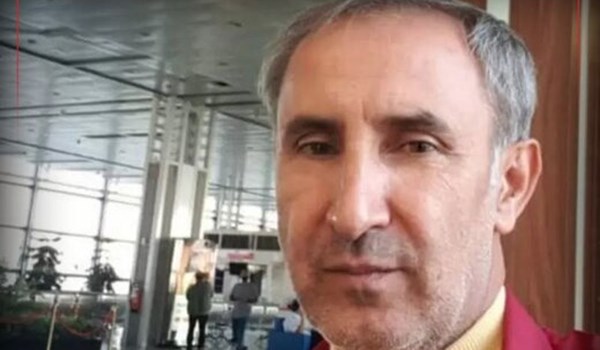Iran’s Judiciary Spokesman Zabihollah Khodayian said on Tuesday that former Iranian official, Hamid Nouri, who is deprived of human rights is being tried in a politically-driven trial in Sweden.
Nouri’s trial couldn’t be described as judicial because it is political and lacks international and even Sweden’s national legal standards, Khodayian said.
A fair trial should adopt specific measures of which Nouri has been deprived, he said, adding that Nouri has even been deprived of his human rights.

Nouri has been deprived of any contact with his family for seven and half months and of in-person meeting with them for two years after being detained by the Swedish government, the spokesman noted.
He has also been denied having appointed attorney and forced to have public defender, although he introduced his attorney, Khodayian said, noting that Nouri was not allowed to be checked by a physician.
The Islamic Republic of Iran defends its citizens and Iran’s Judiciary is following up Nouri’s case to provide him with legal assistance, the spokesman underscored.
He also touched upon Ahmad Reza Jalali’s case, who is waiting execution for spying and terrorism charges in Iran, saying that the defendant’s death sentence has been finalized.
The spokesman said that Jalali was detained in Iran on espionage charges and the Swedish government granted him citizenship after he was detained.
Khodayian dismissed the possibility of swapping Nouri and Jalali, saying that the two cases were independent and Nouri’s detention has no basis.
Nouri’s wife said last Monday that Swedish authorities have put her husband in solitary confinement for over 2.5 years, while conducting brutal acts and insulting him in jail.
“My husband traveled to Sweden with an invitation and as he was disembarking from the plane he was brutally detained and insulted by several police officers in front of a crowd of Iranians and others and taken into custody,” Nouri’s wife said.
She complained that her husband was detained with no declared reason or evidence and placed in solitary confinement for over 30 months.
She further emphasized that Swedish authorities failed to inform Nouri’s family members about his arrest and that they learned from media reports about his detention in Sweden.
Nouri’s wife added that eight months after his arrest she was informed that she can go to the Swedish embassy to hold a brief telephone conversation with her husband under very restricted conditions.
She further censured the brutality and inhumane behavior of Swedish authorities in issuing an international police citation for Nouri along with his photo, requesting any information or complaints against him.
“What kind of human rights is this? They arrested and jailed my husband without any evidence or documents against him and kept renewing his prison term in efforts to gather evidence against him,” she complained. “Aren’t you supposed to be innocent until proven guilty? In the case of my husband, they detained him without any evidence and then started looking for anything they could find against him for his trial.”
Nouri’s daughter also blasted Swedish authorities for their cruel treatment of his father, “beating him severely on several occasions, placing him in solitary confinement, denying medical care and attorney of his choice”.
She further stressed that her father was detained and imprisoned based on baseless claims of unidentified individuals that are members of a violent anti-Iran opposition group who appeared in court and shouted slogans and abusive language against my father.
In relevant remarks on Monday, Iran’s Foreign Ministry Spokesman Saeed Khatibzadeh referred to the trial of an ex-Iranian official in Sweden, and cautioned the Swedish government to stop developing a quid pro quo case to free Ahmad Reza Jalali.
Speaking to reporters in a press conference in Tehran, Khatibzadeh referred to the case of Nouri, who has been tried in Sweden on alleged abuse of prisoners charges in 1988, and the case of Jalali, and said that the two cases are not related at all.
The defeated anti-Iran Mojahedin-e Khalq Organization (MKO also known as MEK, NCRI or PMOI) terrorist group tries to politicize Nouri’s trial in Sweden, he said, adding, that the Swedish government allows the MKO to do so raises suspicion.
Khatibzadeh rejected competence of the Swedish court to consider Nouri’s case, and said basic rights of the Iranian national were not respected in Sweden.
The Swedish government should not think that the case of Jalali will be ignored by taking the case hostage; his case has been espionage and being followed up, he underlined.
Swedish prosecutors have requested the maximum penalty of life imprisonment for Hamid Nouri, accusing the former Iranian judiciary official of prisoner abuse in 1988.
The charges against Nouri stem from allegations leveled against him by members of anti-Iran MKO terrorist group.
He was arrested upon arrival in Sweden at Stockholm Airport in 2019 and was immediately imprisoned. Nouri, now 61, has been held in solitary confinement for over two years and his family has not been allowed to visit him in prison.
His accusers allege that Nouri was involved in the execution and torture of MKO members in 1988. Nouri vehemently rejects the allegations.
During the 89th session of his trial on Friday, Swedish prosecutors read a summary of Nouri’s indictment in court, a day after submitting a request for life imprisonment for him.
The MKO is listed as a terrorist organization by much of the international community. Its members fled Iran in 1986 for Iraq, where they received support from then dictator Saddam Hussein.
The notorious outfit has carried out numerous attacks against Iranian civilians and government officials for several decades.
In 2012, the US State Department removed the MKO from its list of designated terrorist organizations under intense lobbying by groups associated to Saudi regime and other regimes adversarial to Iran.
A few years ago, MKO members were relocated from their Camp Ashraf in Iraq’s Diyala Province to Camp Hurriyet (Camp Liberty), a former US military base in Baghdad, and were later sent to Albania.
Those members, who have managed to escape, have revealed MKO’s scandalous means of access to money, almost exclusively coming from Riyadh.
The MKO terrorist group specified the targets as martyred Lieutenant General Qassem Soleimani, who commanded the Quds Force of the Islamic Revolution Guards Corps (IRGC), and Iranian President Seyed Ebrahim Rayeesi.
The terrorist organization said it would “welcome” their assassination, adding that it desired for the ranking officials to “join” Asadollah Lajevardi, Tehran’s former chief prosecutor, and Ali Sayyad-Shirazi, a former commander of the Iranian Army’s Ground Forces during Iraq’s 1980-88 war against Iran.
Earlier in June 2019, a leaked audio of a phone conversation between two members of MKO, revealed Saudi regime has colluded with the MKO elements to frame Iran for the tanker attacks in the Persian Gulf.
In the audio, which is being released by the Iran Front Page for the first time, Shahram Fakhteh, an official member and the person in charge of MKO’s cyber operations, is heard talking with a US-based MKO sympathizer named Daei-ul-Eslam in Persian, IFP news reported.
In this conversation, the two elements discuss the MKO’s efforts to introduce Iran as the culprit behind the tanker attacks in the Persian Gulf, and how the Saudis contacted them to pursue the issue.
“In the past week we did our best to blame the [Iranian] regime for the (oil tanker) blasts. Saudis have called Sister Maryam (Rajavi)’s office to follow up on the results, [to get] a conclusion of what has been done, and the possible consequences,” Fakhteh is heard saying.
“I guess this can have different consequences. It can send the case to the UN Security Council or even result in military intervention. It can have any consequence,” Daei-ul-Eslam says.
Attacks on two commercial oil tankers in the Gulf of Oman on June 13, 2019 and an earlier attack on four oil tankers off the UAE’s Fujairah port on May 12, 2019, escalated tensions in West Asia and raised the prospect of a military confrontation between Iran and the United States.
The US, Saudi Arabia, and the UAE have rushed to blame Iran for the incidents, with the US military releasing a grainy video it claimed shows Iranian forces in a patrol boat removing an unexploded mine from the side of a Japanese-owned tanker which caught fire in 2019.
It later released some images of the purported Iranian operation after the video was seriously challenged by experts and Washington’s own allies.
The MKO which is said to be a cult which turns humans into obedient robots, turned against Iran after the 1979 Islamic Revolution and has carried out several terrorist attacks killing senior officials in Iran; yet the West which says cultism is wrong and claims to be against terrorism, supports this terrorist group officially.
After the Islamic Revolution in 1979, the MKO began its enmity against Iran by killing over 17,000 Iranians and terrorist activities. Several members of the terrorist group and its leaders are living in France now, freely conducting terrorist activities.
The MKO terrorist group has martyred 17,161 Iranian citizens, including late president Mohammad Ali Rajayee, former prime minister Mohammad Javad Bahonar, late Head of Supreme Judicial Council Ayatollah Mohammad Beheshti, late Deputy Chief of the Iranian Armed Forces General Staff Ali Sayyad Shirazi, and 27 legislators, as well as four nuclear scientists.
 صراط عشق صراط عشق
صراط عشق صراط عشق




